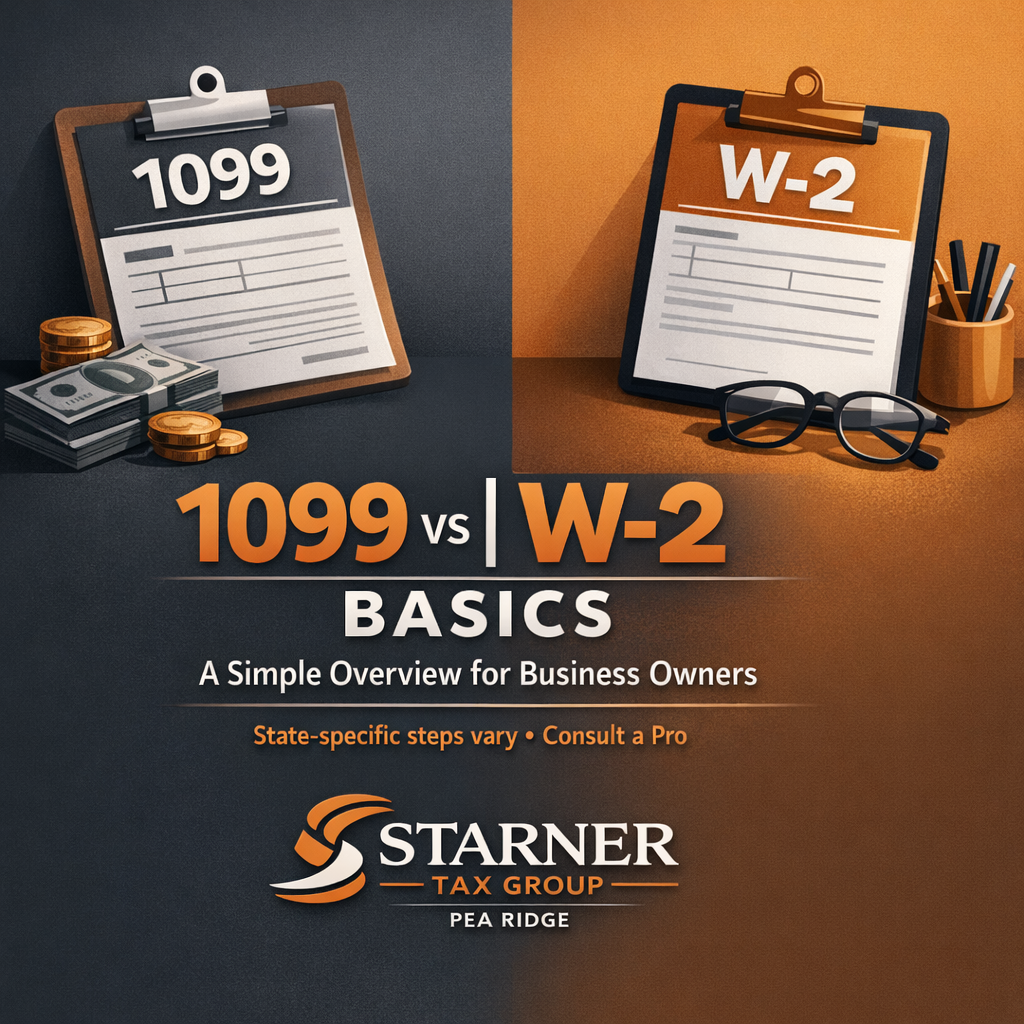Running a seasonal business in Northwest Arkansas or Southwest Missouri comes with unique financial challenges, especially when it comes to tax planning. Because your income and expenses fluctuate throughout the year, managing your tax obligations effectively requires a proactive, year-round strategy. Proper tax planning for seasonal businesses helps you align your cash flow with tax payments, stay compliant with business tax regulations, and optimize deductions and credits specific to your busy and slow seasons.
Whether you operate a tourism-related business, a construction service, or other seasonal ventures, understanding how to navigate your seasonal business tax obligations and cash flow patterns can make the difference between financial stress and smooth operations. This article will help you explore essential tax planning strategies that small business owners like you can use to manage your business tax responsibilities and maintain healthy financial management despite the ups and downs of your seasonality.
Identifying Seasonal Business Tax Obligations
Understanding State and Local Tax Laws
As a seasonal business owner in Northwest Arkansas or Southwest Missouri, understanding your state and local tax obligations is critical to maintaining compliance year-round. Both Arkansas and Missouri have specific sales tax laws that apply even if your business experiences fluctuating sales during your peak and off-peak seasons. For example, in Arkansas, sales tax collection is required based on the delivery location of goods or services, and businesses must file regular sales tax returns regardless of whether they have significant income during some quarters.
Similarly, Missouri requires businesses to collect and remit sales and use taxes based on where tangible personal property is sold or used. You must stay diligent about these requirements to avoid penalties and ensure proper tax compliance despite the seasonality of your sales.
Income Tax Considerations
Income tax is another significant area you must manage strategically as a seasonal business. Both Arkansas and Missouri impose income taxes on businesses, but the rates and filing requirements differ. In Arkansas, corporations pay graduated income tax rates, and if you expect to owe more than $1,000, you are required to make quarterly estimated tax payments to avoid penalties.
These quarterly payments play a significant role in cash flow management for seasonal businesses with fluctuating income. Missouri levies a corporate income tax at a standard rate, with business owners also responsible for withholding employment taxes if they have employees. Importantly, even if your business is quieter during off-peak months, you must still prepare and submit tax filings on time, including income tax returns and employment tax reports.
Awareness of these obligations helps you plan your finances better and stay compliant with both states’ tax authorities.
Strategies for Effective Cash Flow Management
Building a Resilient Financial Buffer
For seasonal businesses, managing cash flow effectively is essential to navigate the inevitable fluctuations throughout the year. One of the most powerful strategies is building a resilient financial buffer during your peak season. By setting aside a portion of your income during high sales periods, you create a safety net that can support your business during slower months.
This buffer helps cover ongoing expenses, quarterly tax payments, and unexpected costs, reducing financial stress and ensuring operational continuity. Prioritizing cash reserves supports smarter financial decisions and improves your ability to meet your business tax obligations on time, especially when cash inflow is inconsistent.
Leveraging Seasonal Peaks for Financial Planning
Leveraging your busy season strategically can transform how you manage your business tax planning and cash flow year-round. By analyzing past sales data and projecting future peak seasons, you can better forecast income and plan expenses accordingly. Thoughtful planning during these high-revenue months allows you to invest in inventory, marketing, and staffing to maximize your profitability.
Moreover, partnerships with businesses that flourish in your off-season can help smooth cash flow fluctuations by creating complementary revenue streams. For example, collaborating with companies whose busy periods align with your slow months can provide steady income, reduce idle resources, and support better tax compliance throughout the year.
Utilizing Tax Deductions and Credits
Exploring Deductions Specific to Regional Businesses
Seasonal businesses in Northwest Arkansas and Southwest Missouri can benefit significantly from tax deductions and credits tailored to the local economic environment. Arkansas, for example, offers various tax incentives such as sales tax exemptions on electricity, natural gas, and coal used directly in manufacturing processes, a valuable deduction if your seasonal business operates equipment or facilities requiring these utilities. Additionally, businesses involved in expansion or modernization projects might qualify for TaxBack sales and use tax refunds, providing a partial refund on purchases of machinery, building materials, and equipment.
Understanding these region-specific tax incentives can help you reduce tax liabilities and enhance your cash flow management throughout the season.
Maximizing Depreciation and Cost Segregation
Another powerful tax strategy for seasonal business owners involves maximizing depreciation deductions and employing cost segregation studies. By accelerating depreciation on qualifying property and equipment, you can reduce your taxable income during peak revenue periods, improving your year-round tax planning strategy.
While Arkansas has unique considerations regarding depreciation rules, such as limitations on section 179 deductions, taking a proactive approach to document and segregate costs related to real estate and tangible personal property can unlock additional current-year tax benefits. Effective use of these tax strategies helps smooth out your tax obligations and supports better cash flow management, ensuring you are not overpaying taxes during slower months and are financially prepared when peak season arrives.
Conclusion
Effective tax planning is essential for seasonal businesses in Northwest Arkansas and Southwest Missouri to optimize cash flow and maintain compliance. Starner Tax Group offers comprehensive tax services tailored to the unique needs of local small business owners, retirees, and cross-state workers.
With expertise in Arkansas and Missouri tax codes, Starner provides personalized solutions, from strategic planning and audit support to multi-state filings and payroll compliance. By partnering with Starner Tax Group, you gain trusted, year-round guidance, advanced technology, and a local team dedicated to helping you minimize liabilities and confidently manage your business tax obligations. Take action today to secure your financial future.
FAQ
What are the key tax planning strategies seasonal businesses in Northwest Arkansas & Southwest Missouri should implement to manage fluctuating income?
Seasonal businesses in Northwest Arkansas & Southwest Missouri should implement proactive year-round tax planning with accurate financial forecasting, adjust quarterly tax payments using the annualized income method, maximize deductions by tracking all expenses, choose appropriate inventory valuation methods, and optimize retirement and investment strategies to manage fluctuating income effectively.
How can seasonal businesses accurately estimate and adjust quarterly tax payments to avoid penalties and overpayment?
Seasonal businesses can accurately estimate and adjust quarterly tax payments by using the annualized income or adjusted seasonal installment methods, which consider income patterns throughout the year for precise estimation. They should forecast finances regularly, adjust payments based on actual income changes, and ensure timely quarterly payments to avoid penalties.
Which common tax deductions and credits are seasonal businesses in this region often overlooking?
Seasonal businesses often overlook Section 179 deductions for immediate expensing of equipment and bonus depreciation on new or used assets placed in service, which now has a 100% rate through 2029. They may also miss deductions for overtime compensation, childcare credits, and cash tips relevant under 2025 reforms.
What options are available for handling net operating losses if a seasonal business incurs more expenses than income in a fiscal year?
Seasonal businesses with net operating losses (NOLs) can handle them by carrying losses back up to five years to offset past taxable income or carrying them forward indefinitely to reduce future taxable income. Using an adjusted seasonal installment method may apply if income is concentrated in certain months. Proper documentation and IRS forms like 1040 or 1120 are required, and consulting a tax professional is advised for accurate NOL calculation and strategy.
NOL deductions help balance income across years to reduce tax burdens during profitable periods.




































































































